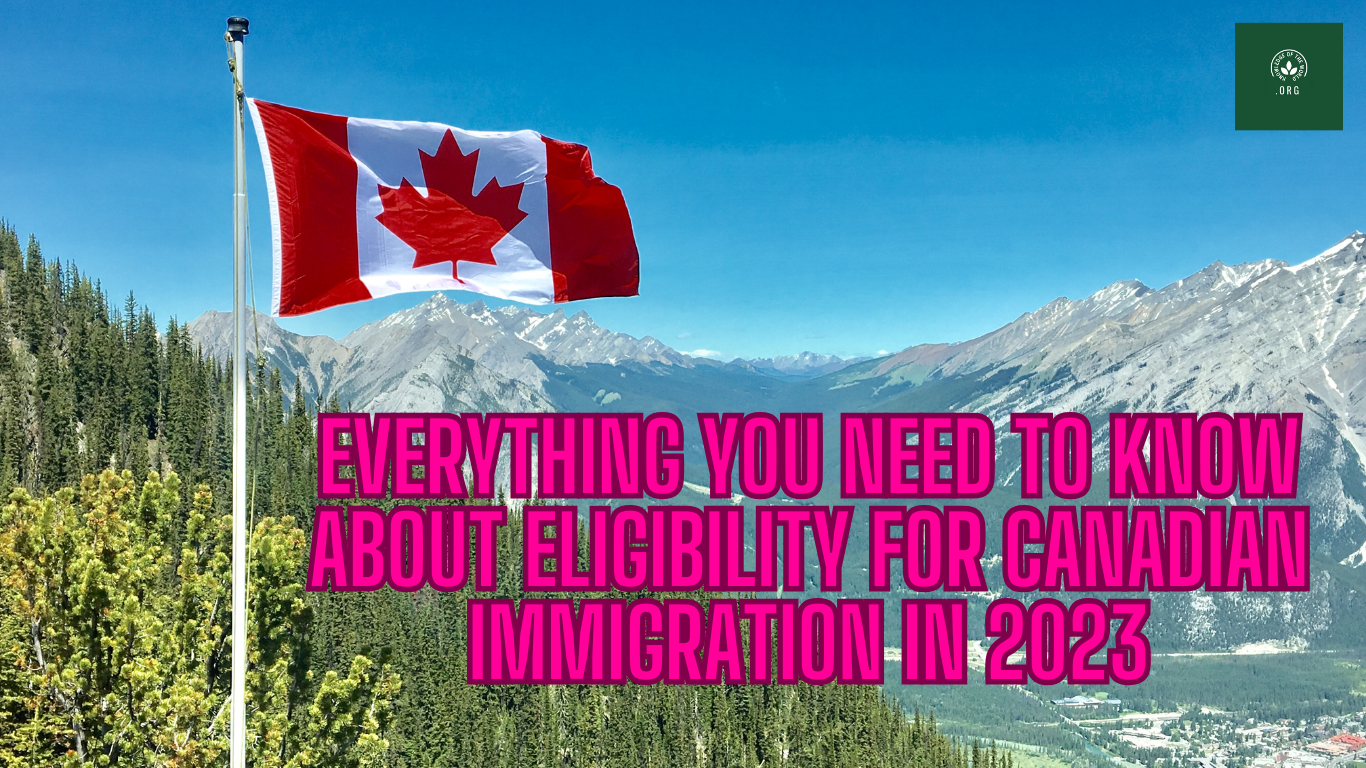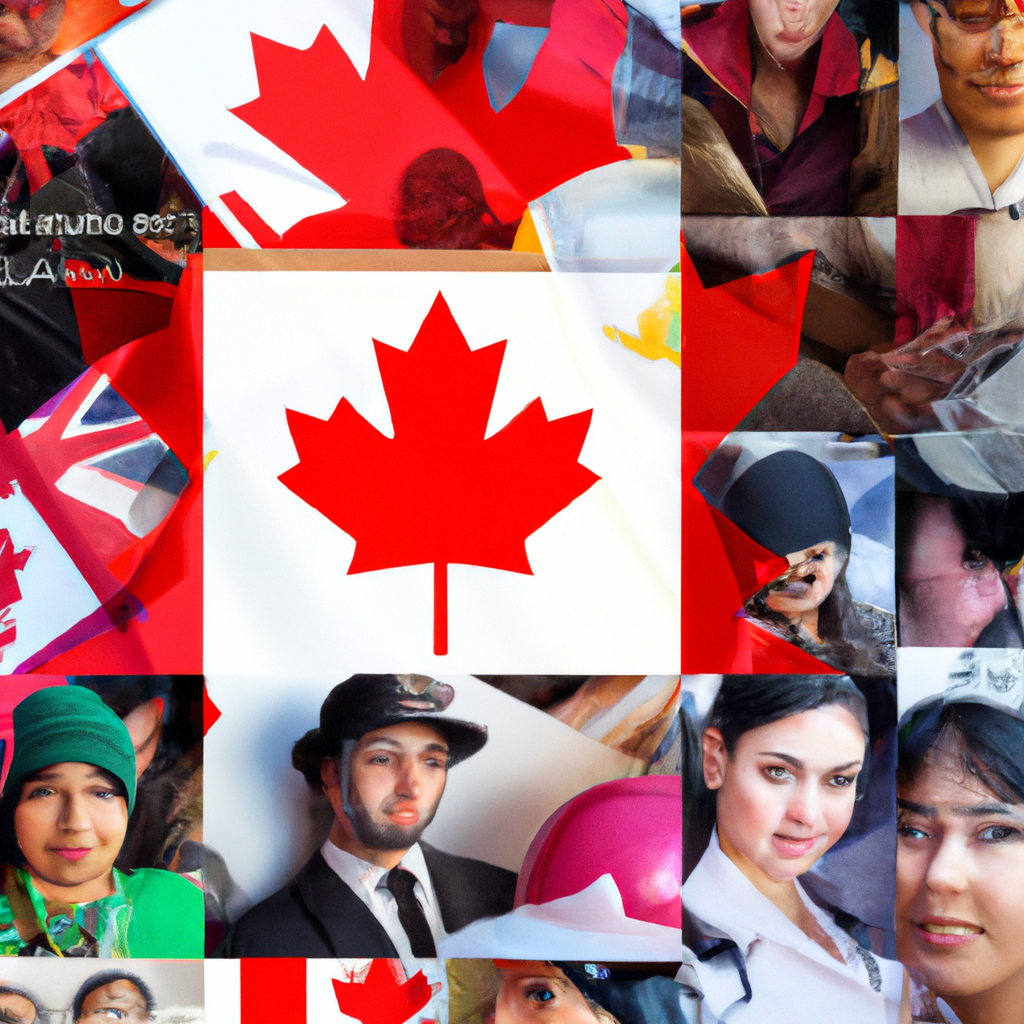
Table of Contents
Canada immigration eligibility is a crucial aspect to consider for individuals seeking to migrate to the country. Understanding the requirements and qualifications is essential to ensure a smooth and successful immigration process. To qualify for Canadian immigration, applicants must meet specific criteria set by the Canadian government. These criteria include factors such as age, education, work experience, language proficiency, and adaptability.
Age is an important consideration when it comes to immigration eligibility. The Canadian government favors younger applicants as they are believed to have a higher likelihood of integrating successfully into Canadian society and contributing to the economy. Additionally, education and work experience play a significant role in determining eligibility.
The Canadian government places value on individuals with higher education degrees and relevant work experience in occupations that are in high demand in the country. Language proficiency in English or French is also crucial, as it demonstrates the ability to communicate effectively in one of Canada’s official languages. Finally, adaptability, which includes factors such as previous work or study experience in Canada, spousal support, and family connections, can enhance an applicant’s eligibility for Canadian immigration. Understanding these criteria is essential for those considering immigrating to Canada.

Overview of Eligibility Requirements
Everything You Need to Know About Eligibility for Canadian Immigration begins with understanding the three important subtopics: Categories of Eligibility, Required Documents, and Work Experience. The Categories of Eligibility encompass various pathways such as skilled worker programs, family sponsorship, and business immigration. To successfully apply, applicants must provide the Required Documents, including identification, educational certificates, and proof of funds. Additionally, Work Experience plays a crucial role in determining eligibility, with specific programs requiring a certain number of years in a skilled occupation. By thoroughly understanding these subtopics, individuals can navigate the complex landscape of Canadian immigration with confidence.
Categories of Eligibility
Transition: Now that we have discussed the importance of eligibility for Canadian immigration, let’s delve into the categories of eligibility.
Categories of Eligibility:
When it comes to Canadian immigration, there are various categories of eligibility that individuals must meet to be considered for entry into the country. These categories are designed to ensure that immigrants possess the skills, qualifications, and experience that will contribute to the Canadian economy and society.
One category is the Federal Skilled Worker Program, which targets individuals with specific occupations in demand in Canada. This program assesses applicants based on factors such as education, work experience, language proficiency, and adaptability.
Another category is the Provincial Nominee Program, which allows provinces and territories to nominate individuals who meet their specific labor market needs. Each province has its own set of criteria and occupations in demand.
Additionally, the Canadian Experience Class is a category for those who have already gained work experience in Canada and wish to transition to permanent residency.
Understanding the different categories of eligibility is crucial for individuals considering immigration to Canada.
Required Documents
After understanding the categories of eligibility for Canadian immigration, it is crucial to know the required documents that are necessary to support your application. Everything You Need to Know About Eligibility for Canadian Immigration includes a comprehensive understanding of the documentation required for a successful application.
To begin with, a valid passport is an essential document that must be submitted. This passport must have at least six months of validity remaining. Alongside the passport, you will need to provide your birth certificate, marriage certificate (if applicable), and any relevant divorce or death certificates.
In addition to these personal documents, you will also need to submit your educational qualifications. This entails providing your transcripts, diplomas, or degrees from your educational institution. It is crucial to ensure that all documents are translated into English or French if they are in another language.
Furthermore, if you have any work experience that is relevant to your immigration application, it is necessary to provide reference letters from your previous employers. These letters should outline your job responsibilities, duration of employment, and any notable achievements.
Work Experience
Moreover, understanding the work experience requirements is crucial to determining eligibility for Canadian immigration. Work experience is an essential factor that immigration authorities consider when evaluating an applicant’s eligibility. To meet the criteria, the applicant must have at least one year of full-time, or equivalent part-time, work experience in a skilled occupation. This work experience must be acquired within the past ten years and must be classified under skill levels 0, A, or B according to the National Occupational Classification system.
Skill level 0 includes managerial positions, while skill level A refers to professional occupations, and skill level B encompasses technical jobs and skilled trades. It is important to note that the work experience must be legally obtained and can be gained both inside and outside of Canada. Therefore, applicants must provide detailed documentation, such as reference letters, employment contracts, and pay stubs, to substantiate their work experience claims. By meeting these work experience requirements, applicants enhance their chances of meeting the eligibility criteria for Canadian immigration.
Express Entry System
Everything You Need to Know About Canada Immigration Eligibility begins with an overview of the Express Entry System. This system, designed by the Canadian government, is a streamlined process for selecting skilled immigrants. It consists of various components, including the Comprehensive Ranking System (CRS) and the Job Bank. The CRS evaluates candidates based on factors such as education, work experience, language proficiency, and age. Furthermore, the system also encompasses the Provincial Nominee Program (PNP), which allows provinces and territories to nominate candidates who meet their specific labor market needs. Understanding these components is crucial for anyone considering immigration to Canada.
Overview of the System
As we delve into the next section, let me paint a picture of the Canadian Express Entry system. Imagine a vast and efficient immigration pathway, meticulously designed to attract talented individuals from around the world. This comprehensive system aims to streamline the process of selecting skilled immigrants, ensuring that only the most qualified candidates are chosen to contribute to Canada’s diverse workforce.
The Express Entry system is a point-based program that evaluates candidates based on factors such as age, education, work experience, and language proficiency. It encompasses three main components: the Federal Skilled Worker Program, the Federal Skilled Trades Program, and the Canadian Experience Class. Each program has its specific criteria and requirements, catering to different skill sets and professional backgrounds.
One significant aspect of the Express Entry system is the Provincial Nominee Program (PNP), which allows Canadian provinces and territories to nominate candidates who meet their specific needs and requirements. These provincial nominations provide additional points to candidates in the Express Entry pool, increasing their chances of being invited to apply for permanent residency.
Components of the System
Everything You Need to Know About Eligibility for Canadian Immigration has provided an insightful overview of the eligibility requirements. Now, let’s delve into the intricate components of the Express Entry System, which serves as a streamlined pathway for skilled individuals to migrate to Canada.
The first component of the system is the Comprehensive Ranking System (CRS), a points-based system that evaluates candidates based on factors such as age, education, language proficiency, work experience, and adaptability. This system ensures that only the most qualified individuals are selected for immigration.
The second component is the Job Bank, an online platform that connects Canadian employers with potential candidates. It allows employers to search for skilled workers who meet their specific requirements and offers candidates the opportunity to showcase their skills and qualifications to potential employers.
Lastly, the Express Entry Pool is where eligible candidates are placed after creating an online profile. Candidates are assigned a Comprehensive Ranking System (CRS) score, and those with the highest scores are invited to apply for permanent residency through regular draws conducted by the Canadian government.
Provincial Nominee Program (Pnp)
Everything You Need to Know About Eligibility for Canadian Immigration
Express Entry System
The Express Entry System is a highly efficient and streamlined process that allows skilled workers to immigrate to Canada. However, it is important to note that there are alternative pathways to Canadian immigration, such as the Provincial Nominee Program (PNP).
The Provincial Nominee Program (PNP) is a unique immigration program that allows individual provinces and territories in Canada to nominate candidates for permanent residency. Each province has its specific criteria and requirements, tailored to address its unique labor market needs. This program enables provinces to select individuals who possess the skills and qualifications that are in high demand within their region.
To be eligible for the Provincial Nominee Program, candidates must meet specific criteria set by the particular province or territory they wish to immigrate to. These criteria can include factors such as work experience, language proficiency, education, and ties to the province.
Provincial Nominee Program
Everything You Need to Know About Eligibility for Canadian Immigration starts with an overview of the Provincial Nominee Program. This program allows Canadian provinces and territories to nominate individuals who want to immigrate to Canada and settle in a specific province or territory. The program is designed to attract skilled workers, entrepreneurs, and international graduates who can contribute to the local economy. To apply for the program, candidates must meet specific eligibility criteria set by the province or territory they wish to settle in. The benefits of the Provincial Nominee Program include faster processing times, additional points in the Express Entry system, and increased chances of obtaining permanent residency in Canada.

Overview of the Program
After exploring the Express Entry System, it is now time to delve into another significant pathway for Canadian immigration: the Provincial Nominee Program. This program is designed to address the specific labor market needs of individual provinces and territories in Canada. The Provincial Nominee Program allows provinces and territories to nominate candidates who possess the skills and experience required to contribute to their local economies.
Under this program, each province or territory in Canada has its unique streams and criteria for selecting candidates. These streams can be based on factors such as education, work experience, language proficiency, or connections to the province through family or past work experience. By participating in this program, candidates have the opportunity to bypass the competitive point-based system of Express Entry and directly apply to a specific province or territory of their choice.
The Provincial Nominee Program is an excellent option for individuals who possess the desired skills and qualifications that align with the specific labor market needs of a particular province or territory.
Applying for the Program
Transition: Now that we have explored the Express Entry System, let us delve into the Provincial Nominee Program, which provides an alternative pathway for skilled workers to immigrate to Canada.
Applying for the Program:
To initiate the application process for the Provincial Nominee Program, individuals must first determine their eligibility for Canadian immigration. Everything you need to know about eligibility for Canadian immigration can be found through extensive research and thorough examination of the requirements outlined by each province or territory.
Once you have determined your eligibility, the next step is to choose the province or territory that aligns with your skills, experience, and aspirations. Each province or territory has its own specific criteria and occupation lists, which cater to the unique economic needs of the region.
After selecting the appropriate province or territory, applicants must submit an Expression of Interest (EOI) or an application to the respective provincial or territorial government. This application will typically require comprehensive documentation, including proof of education, work experience, language proficiency, and settlement funds.
Benefits of the Provincial Nominee Program
Now that we have discussed the Express Entry System, let’s delve into the Provincial Nominee Program and explore its benefits. The Provincial Nominee Program, also known as PNP, is an immigration program designed to meet the specific needs of individual provinces in Canada. It allows provinces and territories to select skilled workers who intend to settle in a particular province and contribute to its economic growth.
One of the key advantages of the Provincial Nominee Program is that it provides a pathway for applicants who may not meet the eligibility criteria of the Express Entry System. The PNP allows candidates to leverage their skills and qualifications to gain entry into Canada and pursue a successful career in their chosen province. By obtaining a provincial nomination, applicants receive additional points in their Express Entry profile, significantly increasing their chances of receiving an Invitation to Apply for permanent residency.
Furthermore, the Provincial Nominee Program offers a more accessible route to Canadian immigration for individuals with specific skills or work experience who are in demand in a particular province.
Family Sponsorship
Family Sponsorship is a vital aspect of Canadian immigration. To understand the program, it is important to gain an overview of its requirements and the child sponsorship process. Everything You Need to Know About Eligibility for Canadian Immigration (Canada immigration eligibility) can be found within these subtopics. The program demands that applicants be at least 18 years old, have a Canadian citizen or permanent resident as a sponsor, and meet specific income requirements. Additionally, child sponsorship is available for parents, grandparents, and dependent children. By exploring these aspects, individuals can gain a comprehensive understanding of the Family Sponsorship program and its eligibility criteria.
Overview of the Program
In addition to the Provincial Nominee Program, another pathway to Canadian immigration is through the Family Sponsorship program. This program allows Canadian citizens and permanent residents to sponsor their family members to come and live in Canada. The Family Sponsorship program is designed to reunite families and promote the well-being of Canadian society.
Under this program, eligible sponsors can sponsor their spouse or common-law partner, dependent children, parents, and grandparents. Sponsors must meet certain requirements, including being at least 18 years old, residing in Canada, and demonstrating the ability to support their sponsored family members financially.
The Family Sponsorship program aims to strengthen family ties and encourage the integration of newcomers into Canadian society. It provides a way for families to be reunited and for individuals to have the support and care of their loved ones. By sponsoring their family members, Canadians can contribute to the growth and diversity of their communities, fostering a sense of belonging and unity.
Child Sponsorship
Child Sponsorship
When it comes to family sponsorship in Canada, child sponsorship is a crucial aspect of the program. Canadian citizens and permanent residents have the opportunity to sponsor their dependent children to come and live with them in Canada. This program aims to reunite families and provide a stable and nurturing environment for children to grow and thrive.
To be eligible for child sponsorship, the sponsor must prove that they can financially support their child and meet their basic needs, such as food, clothing, and shelter. They must also provide evidence of their relationship with the child, such as birth certificates or adoption papers. Additionally, the sponsor must show that they are a Canadian citizen or permanent resident and that they are living in Canada.
Child sponsorship is a wonderful opportunity for families to be reunited and for children to have the chance for a better life in Canada. It ensures that children can grow up in a loving and supportive environment, surrounded by their family and loved ones.
Business Immigration
The Business Immigration program in Canada offers various opportunities for individuals looking to immigrate for business purposes. The program provides an overview of the different options available, such as the Provincial Nominee Program (business streams), which allows individuals to be nominated by a specific province or territory for permanent residency. This program has specific requirements that applicants must meet, including having a certain net worth, relevant business experience, and a plan to invest in and manage a business in the province. Overall, the Business Immigration program offers a pathway for individuals to establish and grow their business ventures in Canada.
Overview of the Program
If you are considering immigrating to Canada for business purposes, you are in for an exciting journey. The Business Immigration program offers a variety of pathways for individuals who wish to invest, start a business, or manage a company in Canada. This program is designed to attract individuals who have the skills, experience, and financial resources to contribute to the Canadian economy.
The Business Immigration program is divided into several categories, each with its own set of requirements and criteria. These categories include the Start-up Visa Program, the Self-Employed Persons Program, and the Immigrant Investor Venture Capital Pilot Program. Each program has its own unique set of benefits and requirements, allowing applicants to choose the best path that aligns with their goals and aspirations.
Through the Business Immigration program, successful applicants will have the opportunity to establish or expand their business in Canada, contribute to job creation, and stimulate economic growth. This program not only benefits the individual applicant but also contributes to the overall prosperity and development of the Canadian business landscape.

Requirements for the Program
Now that you have a good understanding of the family sponsorship program, let’s dive into the requirements for the business immigration program. This program is designed for individuals who wish to establish or invest in a business in Canada.
To qualify for this program, applicants must meet several criteria. First and foremost, they must have a minimum net worth of a certain amount, which varies depending on the specific stream of the program they are applying for. Additionally, applicants must be able to demonstrate a certain level of business experience, typically a minimum number of years in a senior management position or as a business owner.
Furthermore, applicants will need to provide a detailed business plan outlining their proposed venture in Canada. This plan should include information such as the type of business, location, projected financials, and job creation potential. Proof of sufficient funds to invest in the business is also required.
Overall, the business immigration program has specific requirements that applicants must meet to be eligible.
Provincial Nominee Program (Business Streams)
Moreover, another option for individuals seeking to immigrate to Canada is the Provincial Nominee Program (business streams). This program allows provinces and territories to nominate individuals with the necessary skills and experience to fill specific economic needs in their respective regions. The Provincial Nominee program (business streams) is designed to attract entrepreneurs, investors, and self-employed individuals who can contribute to the economic growth of the province or territory.
To be eligible for this program, applicants must meet specific requirements set by the province or territory they wish to settle in. These requirements may include having a certain net worth, investing a minimum amount of money in a business venture, creating job opportunities for Canadian citizens or permanent residents, and demonstrating relevant experience in managing a business.
Each province or territory has its own set of criteria and nomination streams under the Provincial Nominee program (business streams). For example, in British Columbia, there are streams for entrepreneurs, regional entrepreneurs, and strategic projects. These streams cater to different types of business immigrants and have their unique eligibility requirements.
Conclusion
In conclusion, understanding the eligibility requirements for Canadian immigration is crucial for anyone considering a move to the country. The process can seem overwhelming, but with the right information, it becomes more manageable.
The Express Entry system is a popular pathway to Canadian immigration, allowing skilled workers to apply for permanent residency. It evaluates candidates based on factors such as age, education, work experience, and language proficiency. The Provincial Nominee Program is another option, allowing provinces and territories to nominate individuals who have the skills and experience needed in their specific region.
Family sponsorship is an important avenue for those with close relatives in Canada. This program allows Canadian citizens and permanent residents to sponsor their spouse, partner, children, parents, or grandparents for immigration.
Finally, business immigration provides opportunities for entrepreneurs and investors to contribute to the Canadian economy. Programs such as the Start-Up Visa Program and the Self-Employed Persons Program enable individuals with innovative business ideas or self-employment experience to establish themselves in Canada.
Overall, Canada offers a wide range of options for individuals seeking to immigrate. By understanding the eligibility requirements and exploring the different pathways, prospective immigrants can navigate the process with confidence and increase their chances of a successful immigration journey.




